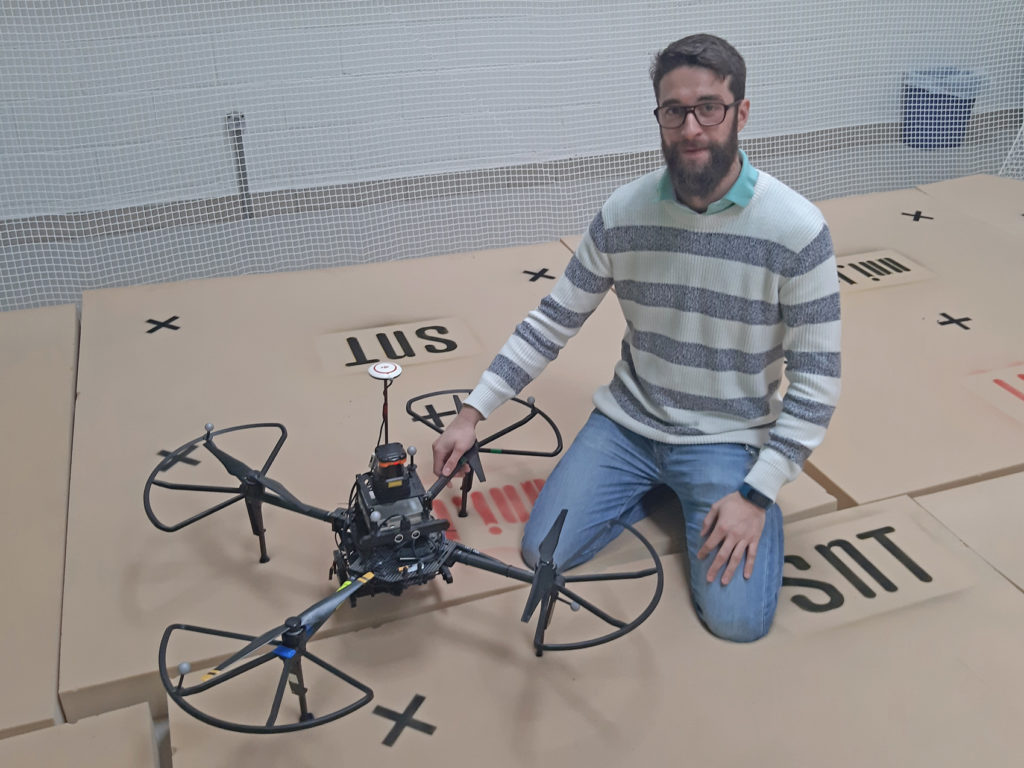BACK TO RESEARCH WITH IMPACT: FNR HIGHLIGHTS
BACK TO RESEARCH WITH IMPACT: FNR HIGHLIGHTS

Jose-Luis Sanchez-Lopez works with multirotor aerial robots – drones. Despite being early in his research career, the Spanish national’s research is already taking off, having secured him several awards at international competitions. After completing his PhD in 2017, Jose-Luis set his sights on Luxembourg, where he works as a Postdoc at the SnT at the University of Luxembourg, with the goal of giving drones enough AI that they can safely operate autonomously in a range of environments.
Jose-Luis’s research brings together two hot topics: Artificial Intelligence (AI) and drones. While one’s thoughts can immediately jump to all kinds of science fiction scenarios, giving drones artificial intelligence can enable them to perform tasks that would take significantly longer for humans, but also tasks that would be dangerous or simply not possible for humans.
Drones with AI can, for example, scan the terrain of a construction site, or drop supplies to victims in hard to reach disaster areas. However, there is still work to be done, for example around situational awareness and trajectory planning.

From software to drone team work
Jose-Luis’s main research goal is to provide aerial robots (drones) with advanced AI, to enable them to achieve a completely autonomous level of operation and in this way expand the list of applications. His research is divided into four areas:
“The first one is the design and development of system and software architectures that consider the requirements of a fully autonomous operation of multirotor aerial robots.
“The second area includes multi-robot approaches for multirotor aerial robots, which take into account the need of combining a set of aerial robots, exploring different methodologies of cooperation, collaboration, and formation, among others.
“The third area relates to semantic situational awareness: providing the aerial robot with rich, accurate and useful information about the environment, by means of classic sensor fusion techniques, combined with novel machine learning techniques. This research enables the navigation of aerial of aerial robots in complex unstructured dynamic environments.
“Finally, my last research area tackles the efficient path and trajectory planning together with the agile control of multirotor aerial robots.”
Jose-Luis’s overall goal is to develop a fully autonomous aerial robot that is versatile enough that it can carry out any mission without restrictions in any environment. There is still work to be done as Jose-Luis explains:
“In order to achieve this, a long way still needs to be covered in fields like versatile systems and software architectures, multi-environment situational awareness, efficient path and trajectory planning together, and agile control of multirotor aerial robots.”

Pushing the boundaries of AI drones
Having completed his PhD in 2017, Jose-Luis is still relatively new to the world of research, but he knows drones: He came in second at the 2012 IMAV (International Micro Air Vehicle Conference), at the 2013 IMAV he scooped first prize, and since then has taken home other awards. During his PhD at the Technical University of Madrid, Jose-Luis also had the chance to get an international perspective, thanks to a six-month research stay at Arizona State University, along with two research stays at the LAAS-CNRS in Toulouse, France.
“During my research career, I have already pushed the boundaries of the autonomous operation of multirotor aerial robots. Thanks to the results of my research, we have managed to develop some fully autonomous applications in some particular environments. My PhD research outcomes were applied to several research, proof of concept, technology transfer and industrial projects with high success and satisfaction of the project funders.”
From Spain to Luxembourg due to better funding opportunities
18 months into being a Postdoc, Jose-Luis explains he has felt many differences compared to when he was a PhD student in Spain:
“When you are a PhD, your main objective is the development of your PhD thesis. I felt all the pressure falling onto me, and the success is highly related to your work. I feel that when you are working as a Postdoc, the personal level fades, and all your work is devoted to the research group you belong to. In addition to this, you are meant to work in a collective way rather than in an individual way, helping PhD students when needed and collaborating with other Postdocs and professors when requested.”
Nonetheless, Jose-Luis PhD work was a huge success, earning his the highest grade and an award for outstanding PhD thesis.
When asked why he decided to leave Spain to continue his research in Luxembourg, Jose-Luis explains that the wealth of funding opportunities for his research were a big factor.
“On a personal level, I love Luxembourg, as it is small and therefore manageable, but at the same time very vibrant and cosmopolitan country with a young university that provides a good opportunity to implement fresh, good ideas that can push your research to a very high level,” Jose-Luis adds.
Jose-Luis has been funded through the FNR CORE project BEST-RPAS (Principal Investigator: Prof. Holger Voos), as well as the FNR POC (JUMP) project AFI (Principal Investigator: Dr. Miguel Olivares-Mendez, who has also been featured in Spotlight on Young Researchers.)
About Spotlight on Young Researchers
Spotlight on Young Researchers is an FNR initiative to highlight early career researchers across the world who have a connection to Luxembourg. The campaign is now in its 4th year, with 45+ researchers already featured. Discover more young researcher stories below.
